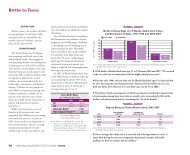2010 Rhode Island Kids Count Factbook
2010 Rhode Island Kids Count Factbook
2010 Rhode Island Kids Count Factbook
Create successful ePaper yourself
Turn your PDF publications into a flip-book with our unique Google optimized e-Paper software.
Disconnected Youth<br />
DEFINITION<br />
Disconnected youth is the number of<br />
<strong>Rhode</strong> <strong>Island</strong> youth who are in foster<br />
care, involved in the juvenile justice<br />
system, teen parents or high school<br />
dropouts. Youth may be in more than<br />
one of these groups.<br />
SIGNIFICANCE<br />
Youth who have weak connections<br />
to families, positive social networks,<br />
and communities that can provide<br />
emotional and material support and<br />
guidance are at great risk as they<br />
transition to adulthood. All youth,<br />
regardless of their background or<br />
financial status, need the guidance, time<br />
and financial help of a stable and secure<br />
family. They need access to caring<br />
adults who, as mentors, can provide<br />
information and supports that will<br />
help them make good choices for their<br />
futures. Youth are more likely to make a<br />
successful transition to adulthood when<br />
they have the life experiences, adult<br />
supports and education that build skills,<br />
academic credentials, knowledge and<br />
confidence. 1,2<br />
Disconnected youth often depend<br />
on effective public systems to get the<br />
supports and resources they need to<br />
overcome obstacles and challenges.<br />
These youth depend on the child<br />
welfare system to help them make<br />
strong family connections, the juvenile<br />
justice system for fair treatment and<br />
rehabilitative supports, public schools to<br />
teach them the skills and knowledge to<br />
be independent adults, and the public<br />
health and human services systems<br />
for the resources to be physically and<br />
mentally healthy and meet their family<br />
responsibilities. 3,4 When these systems<br />
do not work well, youth end up at<br />
greater risk for long-term disconnection<br />
than when they entered. 5<br />
Interventions for disconnected<br />
youth require strategies that are tailored<br />
to the individual strengths and life<br />
circumstances of the youth. These<br />
interventions can include comprehensive<br />
case management, mental health and<br />
substance abuse treatment, independent<br />
living transition supports, community,<br />
school and workforce reentry supports,<br />
mentorship, out-of-school-time<br />
programs, parenting supports, and<br />
high-quality alternative educational<br />
opportunities. Disconnected youth also<br />
may face additional challenges because<br />
they are homeless, have mental health<br />
or substance abuse issues, or identify as<br />
lesbian, gay, bisexual, transgender or<br />
queer (LGBTQ). 6,7,8<br />
Some disconnected youth reconnect<br />
to their communities through<br />
employment, school, marriage, or the<br />
military. However, youth from lowincome<br />
families and minority youth<br />
are less likely to reconnect than other<br />
disconnected youth. 9<br />
References<br />
1,8<br />
Fernandes, A. L. (2007). Runaway and homeless youth:<br />
Demographics, programs and emerging issues. CRS<br />
Report for Congress. Washington, DC:<br />
Congressional Research Service.<br />
Disconnected Youth in <strong>Rhode</strong> <strong>Island</strong><br />
Youth in Foster Care<br />
◆ Youth who age out of foster care without permanent family connections experience<br />
high rates of economic hardship, low educational attainment, hunger, homelessness,<br />
incarceration, welfare use, unemployment, and poor health. 10 In 2009 in <strong>Rhode</strong> <strong>Island</strong>,<br />
there were 1,056 youth ages 13 to 17 and 237 youth ages 18 to 21 who were in the care<br />
or custody of the <strong>Rhode</strong> <strong>Island</strong> Department of Children, Youth and Families (DCYF). 11<br />
In <strong>Rhode</strong> <strong>Island</strong> in Federal Fiscal Year 2009, 151 youth aged out of foster care to<br />
emancipation never having gained permanent placement through reunification, adoption<br />
or guardianship. 12<br />
Youth at the <strong>Rhode</strong> <strong>Island</strong> Training School<br />
◆ Many youth who are incarcerated as juveniles struggle with school re-enrollment,<br />
homelessness, mental health problems, substance abuse, and poverty when they return to<br />
their communities, and they often lack the necessary supports to avoid re-offending. 13<br />
During 2009, 894 youth ages 12 to 22 were in the care or custody of the <strong>Rhode</strong> <strong>Island</strong><br />
Training School. 14<br />
Teen Parents<br />
◆ Teen pregnancy and parenting threatens the healthy development of teen parents as well<br />
as their children. Reduced educational attainment among teen parents puts them at risk of<br />
dropping out, low wages and poverty. 15 During 2009, there were 1,049 births to teen mothers<br />
under age 20 in <strong>Rhode</strong> <strong>Island</strong>. Of these, 594 did not have a high school diploma or GED. 16<br />
High School Dropouts<br />
◆ Youth who drop out of school are at risk of unemployment, poverty, receiving public<br />
assistance, incarceration and having poor health. 17 During the 2008-2009 school year, 2,917<br />
students in 7th through 12th grades dropped out of <strong>Rhode</strong> <strong>Island</strong> public schools. 19 Between<br />
2006 and 2008, there were an estimated 4,323 <strong>Rhode</strong> <strong>Island</strong> youth ages 16 to 19 who<br />
were not in school and not working, 55% of whom were high school dropouts. 19<br />
2, 4,7,15<br />
2004 KIDS COUNT data book essay: Moving youth<br />
from risk to opportunity. (2004). Baltimore, MD:<br />
Annie E. Casey Foundation.<br />
(continued on page 167)<br />
90 <strong>2010</strong> <strong>Rhode</strong> <strong>Island</strong> KIDS COUNT <strong>Factbook</strong> / Safety






